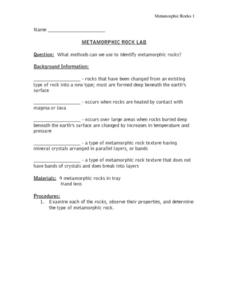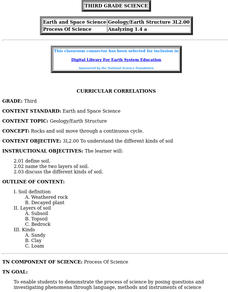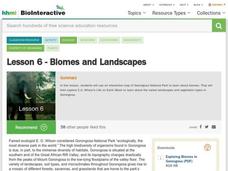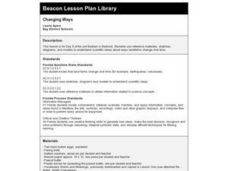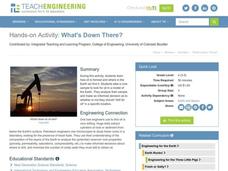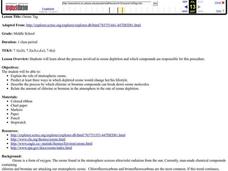Curated OER
Metamorphic Rock Lab
In this metamorphic rock worksheet, young scholars observe 9 metamorphic rock samples and indicate the grain size, if there are bands, if there are layers , if it is foliated and they identify the name of the rock. They complete 5...
Curated OER
Its Getting Thinner and Thinner
Pupils design posters on the ozone to be judged. They design a board game on the depletion of the ozone and list the layers of the atmosphere. They construct a collage of the atmosphere into layers according to the way temperature...
Curated OER
The No Zone of Ozone
Pupils explore the causes and effects of the Earth's ozone holes through discussion and an interactive simulation. Using gumdrops and toothpicks, they conduct a large-group, interactive ozone depletion model.
Curated OER
Curricular Correlations
An interesting lesson on different types of soils is here for you. In it, learners discuss what soil is, and consider three piles of soil - clay, sand, and loam. During the rest of the lesson, third graders discover all sorts of...
Curated OER
Plate Tectonics & Land Forms
Fourth graders discuss the different interactions of plates and the ways mountains are created. In this plate tectonics lesson students complete an activity in groups.
Curated OER
Layer By Layer
Have your class learn about the formation of the Grand Canyon using this lesson. After listening to a variety of stories about the Grand Canyon and erosion, learners complete worksheets related to the geology of this area. What a...
Howard Hughes Medical Institute
Lesson 6: Biomes and Landscapes
Aside from the amazing animals in Gorongosa National Park, what else is there to discover? The sixth installment in an eight-part themed series contains an interactive map where scholars can learn more about the geographic features of...
Curated OER
Changing Ways
Third graders examine hard boiled eggs as possible models for the earth's layers.
Curated OER
What's down there?
students analyze how oil is formed and where in the Earth we find it. Students take a core sample to look for oil in a model of the Earth. They analyze their sample and make an informed decision as to whether or not they should "drill...
Curated OER
Geologic Timelines
Students view geologic time lines and discuss how old the Earth and solar system is, when dinosaurs roamed Earth, and when humans first appeared. They review the four major eons and life that was present in each before creating a time...
Curated OER
Science: Draining the Land - the Mississippi River
Students use topographic maps to identify parts of rivers. In addition, they discover gradient and predict changes in the channels caused by variations in water flow. Other activities include sketching a river model with a new channel...
Curated OER
Ozone and Temperature Data Analysis, South Pole Antarctica
Students discuss the layers of the atmosphere, and the history of the ozone hole. They discuss the chemistry of the ozone formation. Students compare seasonal data collected with ozonesondes. They compare Antarctic and Arctic ozone hole...
Curated OER
Rocks, Minerals, and Erosion
Students identify and describe rocks that contain records of the earth's history and explain how they were formed. They formulate questions about and identify needs and problems related to objects and events in the environment, and...
Curated OER
Aquifers and Groundwater
Students understand the purpose of an aquifer. In this aquifer and groundwater activity, students build a model aquifer find its relationship to water usage. Students record observations as they build the layers of the aquifer.
Curated OER
The Atmosphere Then and Now
Students recall details about the formation of the earth and early atmosphere. They name the layers of the atmosphere and compare amounts of atmospheric nitrogen, oxygen, and argon. Formulate questions about global warming.
Curated OER
Coal: More Than Meets the Eye!
Students participate in a hands-on simulation to help them explain that coal resources are deposited unevenly between the earth's surface and under the ground.
Science Matters
Earthquake Waves: Wave Notes
A multi-part lesson opens with a review of p waves and s waves. Then scholars use a simple s wave simulator to view the way the wave travels. Next, pupils use cups and various fluids to simulate p waves moving through different...
Curated OER
Ozone Tag
Seventh graders explain the role of stratospheric ozone and predict at least three ways in which depleted ozone would change her/his lifestyle. They then describe the process by which chlorine or bromine compounds can break down ozone...
Curated OER
Geologic Age
Students investigate rocks. In this geologic age lesson, students conduct an experiment to determine absolute age as one would for rock layers. Students graph data and problem solve using results.
Curated OER
Convection in a Pan
Students explore convection. In this lesson on heat and energy, students investigate how heat moves in convection currents. They use their finding to better understand how convection currents effect the movement of tectonic plates.
Project SMART
Rocks and Minerals: Touch the Earth
Students complete a unit of lessons on rocks and minerals. They conduct research, write e-mail questions to geologists, write daily journal entries, label maps demonstrating types of rocks/minerals found, and create a web page that...
Curated OER
Candy Quakes
Eighth graders use candy to show the effects of deformation forces on the earth's crust. In this rock and fossil formation lesson students construct models and simulations to describe and explain natural phenomena.
Curated OER
Interior of the Earth
Sixth graders identify and describe the composition and physical properties of the layers of the Earth. They also explain how scientists used the scientific process to know about the center of the Earth. Finally, 6th graders read a...
Curated OER
Oil Trap Model
Students investigate oil accumulation by creating a model in their classroom. In this petroleum geology lesson plan, students discuss where oil comes from and why it is vital to our society at this particular time. Students cut out a 3-D...


